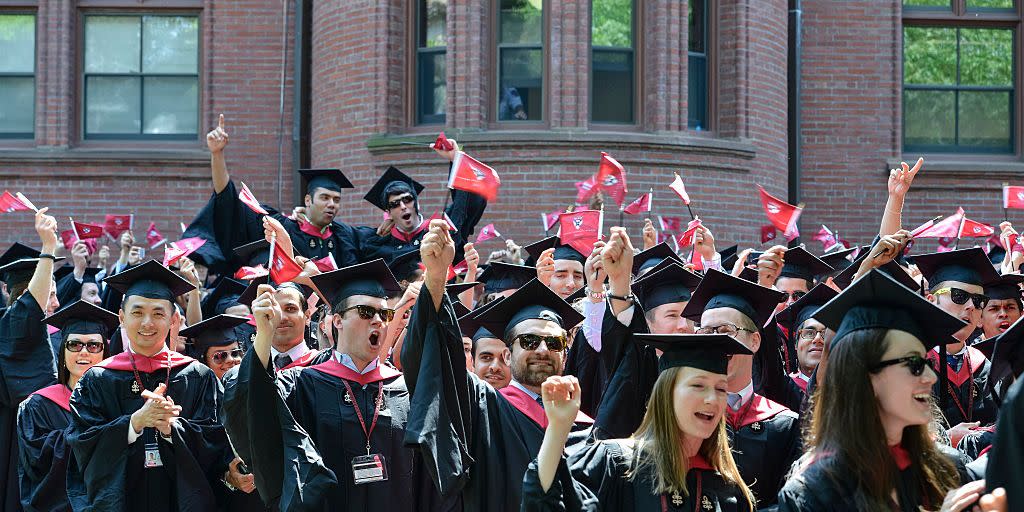Where Did Joe Biden & Kamala Harris Go To School?

Update: When President Joseph Biden and Vice President Kamala Harris were sworn into office earlier today, they became the first President and Vice President combo in 36 years with no Ivy League credentials on their resumes—and Harris the first Vice President with a degree from an HBCU. Both of their alma maters celebrated the occasion.
The University of Delaware, where Biden received his undergraduate degree, posted on Twitter, “From our house to the White House: Congratulations to the 46th President of the United States @JoeBiden, University of Delaware Class of 1965.”
From our house to the White House: Congratulations to the 46th President of the United States @JoeBiden, University of Delaware Class of 1965. #Inauguration2021 pic.twitter.com/ipyKSV6pEt
— Univ. of Delaware (@UDelaware) January 20, 2021
Howard University, which Harris attended, tweeted, “It is official! Howard alumna, @KamalaHarris is now the Vice President of the United States of America!”
It is official! Howard alumna, @KamalaHarris is now the Vice President of the United States of America! #HU2WH pic.twitter.com/Vfx9xLrhpI
— Howard University (@HowardU) January 20, 2021
Read the original story, published on October 7, 2020, below.
When Joe Biden picked Kamala Harris to be his running mate in August, they became the first Democratic ticket since 1984 in which neither candidate attended an Ivy League college or graduate school. Biden received his BA from University of Delaware and his law degree from Syracuse University. Harris graduated from Howard University and then University of California Hastings College of Law.
Republicans are fielding a ticket with one Ivy League graduate—President Trump attended University of Pennsylvania's Wharton School of Finance. The last time the GOP nominated a non-Ivy pair was when John McCain and Sarah Palin ran in 2008.

If Biden and Harris win the election on November 3, they will be the first President–Vice President combo in which neither holds an Ivy League degree since Jimmy Carter and Walter Mondale were in office 36 years ago. It will also be the first time the country will have a Vice President who graduated from an Historically Black College or University.
But do voters really make decisions based on where a candidate went to school, or is the obsession with a candidate’s resume just prime-time fodder?
Voters claim it doesn’t matter
According to a 2014 Pew University survey of a group of American voters, 74 percent of respondents said it didn't matter to them if a candidate attended “a prestigious university such as Harvard or Yale.” Only 19 percent said they’d be more likely—and six percent less likely—to support such a candidate.
A more recent analysis, published in 2018 in the journal Electoral Studies, showed that preferences about candidates’ educational backgrounds can be found in voters of different political leanings. When asked to review hypothetical candidates, a group of voters who identified as conservative said they found Ivy League candidates less relatable and that they'd be less likely to vote for them. Voters who identified as liberal said they believed the candidates with Ivy League educations were more competent but said they were no more or less likely to vote for someone if they went to an Ivy.

How do candidates feel about it?
President Trump has made no secret that he thinks educational background is important. In a conversation with reporters outside the White House in 2017 in which he said he was often portrayed negatively by the press, he said, “I went to an Ivy League college. I was a nice student. I did very well. I’m a very intelligent person.”
The issue of intelligence and school came up at last week’s Presidential debate after Biden said of the President’s handling of the pandemic, "a lot more people are going to die unless he gets a lot smarter, a lot quicker." Trump responded, “Did you use the word smart? So you said you went to Delaware State, but you forgot the name of your college. You didn't go to Delaware State. You graduated either the lowest or almost the lowest in your class. Don’t ever use the word smart with me. Don’t ever use that word." (The “Delaware State” jab was a repeat of an assertion—which Biden has repeatedly and strongly denied—that Biden misspoke in a speech when describing where he went to school.)
Sometimes an Ivy education can be a liability
Where you went to school has long served as a not-so hidden signifier—in politics and other areas of life—of status. A generation ago, it was fair to assume that those who attended Ivy League schools were probably wealthy, socially connected, and majority white. That profile has changed somewhat as Ivy League schools have sought to diversify the racial and economic makeup of their student bodies. Last year’s “Varsity Blues” admissions scandal added a complicating layer to public perception of elite schools.

The connotation of privilege that comes with an Ivy League education has sometimes been seen as a political liability. After he graduated from Harvard in 1969, Al Gore Jr. decided to join the army because, among other reasons, he was worried that having a son who went to Harvard and then received a deferral from the draft would hurt his father’s reelection campaign. (Gore Jr. went to Vietnam, but his father lost the Tennessee Senate seat anyway.)
Some candidates have attempted to weaponize the issue. In a 2014 Arkansas Senate campaign debate, Mark Pryor said of his opponent, Republican Tom Cotton, “He brags on the fact that he went to Harvard. He used Harvard to further his political career.” Later in the debate, Pryor returned to Cotton’s education, joking, “He probably couldn’t get in at the University of Arkansas.” Despite the burn, Cotton won the seat.
Here's a look at where some recent candidates went to school.
You Might Also Like


